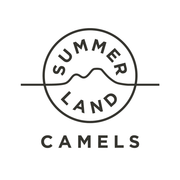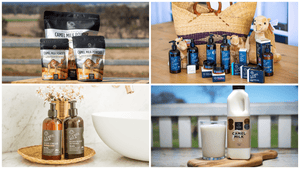Anti-Inflammatory Properties of Camel Milk
Camel Milk and Inflammation
In the realm of natural remedies, Camel Milk has been found to be effective in the fight against inflammation. Rich in unique ingredients, Camel Milk has been used to soothe and treat inflammation from within our bodies and upon our skin. Let’s investigate what the research has found thus far in this exploration of the benefits of Camel Milk in the fight against inflammation.
The Nutritional Content of Camel Milk
The nutritional content of camel milk contributes to its anti-inflammatory effects through the components that each play a role in modulating the body’s immune response and reducing inflammation. Here’s a closer look at some of these components and their functions:
- Camel milk contains a higher concentration of immunoglobulins compared to cow’s milk[1]. Immunoglobulins are antibodies that play a crucial role in the immune system by identifying and neutralising pathogens such as bacteria and viruses. They can also help modulate the immune response, potentially reducing unnecessary inflammatory reactions that can contribute to chronic inflammation and autoimmune diseases[2].
- Lactoferrin: This is a glycoprotein widely recognised for its anti-inflammatory, antimicrobial, and immunomodulatory properties. Lactoferrin can bind to iron, depriving bacteria of the iron needed for growth. It also helps regulate the release of pro-inflammatory cytokines and can stimulate the immune system in a way that reduces inflammation[3]. The concentration of lactoferrin in camel milk is higher than in cow’s milk[4].
- Camel milk has a high level of lysozyme, an enzyme that protects against bacterial infection by breaking down bacterial cell walls[5]. By controlling bacterial populations, lysozyme can reduce the incidence of infection-triggered inflammation in the body[6].
- Vitamins and Minerals. Camel milk is rich in Vitamin C[7], magnesium and zinc[8]. Vitamin C is a potent antioxidant that can reduce oxidative stress, a condition that triggers inflammation[9]. Magnesium plays a role in numerous biochemical reactions in the body, including those that regulate the inflammatory response[10]. Zinc is crucial for immune function, and its deficiency is linked to increased inflammation and impaired immune response[11].
- Fatty Acids. The fatty acid profile of camel milk includes components such as linoleic acid and long-chain polyunsaturated fatty acids[12], which have been shown to have anti-inflammatory properties. These fatty acids can modulate the immune system and reduce the production of inflammatory cytokines, molecules that signal inflammation in the body[13].
- A molecule that inhibits the oxidation of other molecules, protecting cells from damage caused by free radicals, is known as an antioxidant[14]. Camel milk has various constituents that act as antioxidants, such as α-lactalbumin, β-caseins and vitamin C, which are key factors in preventing the development and progression of inflammation[15].
Potential in Treating Autoimmune Diseases
Some studies have explored the use of camel milk in treating autoimmune diseases, such as diabetes (type I[16] and II[17]) and rheumatoid arthritis[18]. These conditions are characterised by inflammation, and the consumption of camel milk has been reported to help in reducing symptoms in some cases, possibly due to its immunomodulatory effects[19].
In recent breakthroughs, researchers at Harvard Medical School have identified that a common bacterial pathogen – Staphylococcus aureus plays a major role in the discomfort experienced by sufferers of eczema[20]. Ingested Camel milk has been found to have a protective effect against Staphylococcus aureus[21].

Topical Application
While most research focusses on the consumption of camel milk, there is also growing interest in its topical application for skin conditions. Due to its structure, antimicrobial properties and α-hydroxy acids[22], camel milk may help in treating skin infections and inflammation when applied externally.
- Eczema, or atopic dermatitis, is characterised by dry, itchy, and inflamed skin. The anti-inflammatory properties of camel milk, along with its moisturising effects, can help soothe the skin, reduce irritation, and possibly minimise the severity of eczema flare-ups. The presence of immunoglobulins can also play a role in modulating immune responses associated with eczema[23].
- Psoriasis is an autoimmune condition that results in the rapid build-up of skin cells, leading to scaling on the skin’s surface. The anti-inflammatory and immunomodulatory components of camel milk may help in reducing the inflammation and the rate of skin cell proliferation. Moreover, the moisturising properties of camel milk may help alleviate the dryness and cracking associated with psoriasis[24].
- Other Skin Conditions. For other inflammatory and autoimmune skin conditions, camel milk’s unique properties, including antimicrobial and antioxidant effects, could potentially aid in reducing symptoms. Its application might help in managing conditions like acne[25], rosacea, and skin infections by providing a natural barrier against pathogens and oxidative stress[26].
Harnessing the benefits of Camel Milk
In our quest to harness the unique benefits of Camel Milk for reducing inflammation, we’ve developed a range of recommendations for both internal and topical use.
Consuming camel milk can be a delicious and nutritious part of your daily routine. We suggest drinking up to two glasses of Camel Milk per day or incorporating two tablespoons of Camel Milk Powder into Camel Milk Chai Latte or your favourite smoothie recipe. This not only provides a delicious way to enjoy the health benefits of camel milk, but also supports your overall well-being by leveraging its anti-inflammatory properties.

For those looking to utilise our Camel Milk Skincare, our specially formulated Body Cream offers a luxurious way to soothe and nourish your skin. Infused with Sweet Orange and Lavender essential oils[27], this cream is perfect for general use; however, individuals with particularly sensitive or highly inflamed skin should be aware of the potential effects of the oils. In such cases, our Unscented Cleansing Bar serves as an excellent alternative, providing gentle yet effective care without the risk of irritation.
Infants and those with severely inflamed skin conditions may benefit significantly from a soothing Camel Milk bath. We recommend adding five or six pumps of our Body Cream to lukewarm water for a gentle, relaxing soak that helps to calm irritated skin. If essential oils present a concern, substituting 1 litre of Fresh Camel Milk into a bath offers a beautifully simple and natural remedy, harnessing the milk’s inherent soothing properties to alleviate discomfort and promote healing.
Beyond our featured Camel Milk Body Cream and Unscented Cleansing Bar, it's worth exploring our full range of skincare products, each developed with the nourishing power of camel milk to cater to sensitive or irritated skin. At Summer Land Camels, we understand that individual skin types and conditions vary, which is why we've developed an array of skincare products to meet different needs and preferences. Our skincare products are designed to harness the gentle, healing properties of camel milk, offering soothing relief and rejuvenation – a superfood for your skin!
While the emerging research on Camel Milk is promising, we encourage you to consult with a healthcare professional before incorporating it into your health regimen, especially for managing chronic conditions.
At Summer Land Camels, we are committed to offering sustainable and healthy solutions through the remarkable benefits of Camel Milk. Whether enjoying the taste of fresh camel milk, or luxuriating in our skincare, our products are designed with your health and well-being in mind, ensuring that you can enjoy the natural goodness of camel milk to feel well, and do good.
References
[1] Rasheed Z. Medicinal values of bioactive constituents of camel milk: A concise report. Int J Health Sci (Qassim). 2017;11(5):1-2.
[2] Justiz Vaillant AA, Jamal Z, Patel P, et al. Immunoglobulin. [Updated 2023 Aug 28]. In: StatPearls [Internet]. Treasure Island (FL): StatPearls Publishing; 2024 Jan-. Available from: https://www.ncbi.nlm.nih.gov/books/NBK513460/
[3] Vorland LH. Lactoferrin: a multifunctional glycoprotein. APMIS. 1999 Nov;107(11):971-81.
[4] Li X, Li Z, Xu E, et al. Determination of Lactoferrin in Camel Milk by Ultrahigh-Performance Liquid Chromatography-Tandem Mass Spectrometry Using an Isotope-Labeled Winged Peptide as Internal Standard. Molecules. 2019;24(22):4199. Published 2019 Nov 19. doi:10.3390/molecules24224199
[5] Swelum AA, El-Saadony MT, Abdo M, et al. Nutritional, antimicrobial and medicinal properties of Camel's milk: A review. Saudi J Biol Sci. 2021;28(5):3126-3136. doi:10.1016/j.sjbs.2021.02.057
[6] Ferraboschi P, Ciceri S, Grisenti P. Applications of Lysozyme, an Innate Immune Defense Factor, as an Alternative Antibiotic. Antibiotics (Basel). 2021;10(12):1534. Published 2021 Dec 14. doi:10.3390/antibiotics10121534
[7] Farah Z, Rettenmaier R, Atkins D. Vitamin content of camel milk. Int J Vitam Nutr Res. 1992;62(1):30-33.
[8] Swelum et al. ibid.
[9] Carr AC, Maggini S. Vitamin C and Immune Function. Nutrients. 2017;9(11):1211. Published 2017 Nov 3. doi:10.3390/nu9111211
[10] Ashique S, Kumar S, Hussain A, et al. A narrative review on the role of magnesium in immune regulation, inflammation, infectious diseases, and cancer [published correction appears in J Health Popul Nutr. 2023 Nov 2;42(1):117]. J Health Popul Nutr. 2023;42(1):74. Published 2023 Jul 27. doi:10.1186/s41043-023-00423-0
[11] Prasad AS. Zinc in human health: effect of zinc on immune cells. Mol Med. 2008;14(5-6):353-357. doi:10.2119/2008-00033.Prasad
[12] Gorban AM, Izzeldin OM. Fatty acids and lipids of camel milk and colostrum. Int J Food Sci Nutr. 2001;52(3):283-287. doi:10.1080/713671778
[13] Al-Nasseri RH, Al-Ruquashi H, Al-Sabahi J et al. Lipids derived from Camel milk regulate NLRP3 inflammasome subunit-dependent inflammatory responses in human macrophages. Functional Foods in Health and Disease 2019;9(4):224-240
[14] Harvard T.H. Chan School of Public Health. https://www.hsph.harvard.edu/nutritionsource/antioxidants/
[15] Behrouz S, Saadat S, Memarzia A, Sarir H, Folkerts G, Boskabady MH. The Antioxidant, Anti-Inflammatory and Immunomodulatory Effects of Camel Milk. Front Immunol. 2022;13:855342. Published 2022 Apr 12. doi:10.3389/fimmu.2022.855342
[16] Mirmiran P, Ejtahed HS, Angoorani P, Eslami F, Azizi F. Camel Milk Has Beneficial Effects on Diabetes Mellitus: A Systematic Review. Int J Endocrinol Metab. 2017;15(2):e42150. Published 2017 Mar 11. doi:10.5812/ijem.42150
[17] Amel Sboui, Chiraz Atig, Abdelmajid Khabir, Mohamed Hammadi, Touhami Khorchani, "Camel Milk Used as an Adjuvant Therapy to Treat Type 2 Diabetic Patients: Effects on Blood Glucose, HbA1c, Cholesterol, and TG Levels", Journal of Chemistry, vol. 2022, Article ID 5860162, 6 pages, 2022. https://doi.org/10.1155/2022/5860162
[18] Arab HH, Salama SA, Abdelghany TM, et al. Camel Milk Attenuates Rheumatoid Arthritis Via Inhibition of Mitogen Activated Protein Kinase Pathway. Cell Physiol Biochem. 2017;43(2):540-552. doi:10.1159/000480527
[19] Kocyigit, E., Abdurakhmanov, R. & Kocyigit, B.F. Potential role of camel, mare milk, and their products in inflammatory rheumatic diseases. Rheumatol Int 44, 425–434 (2024). https://doi.org/10.1007/s00296-023-05516-x
[20] https://www.independent.co.uk/news/health/eczema-itch-cause-treatment-b2465732.html
[21] Soliman, M. M., Hassan, M. Y., Mostafa, S. A., Ali, H. A., Saleh, O. M."Protective effects of camel milk against pathogenicity induced by Escherichia coli and Staphylococcus aureus in Wistar rats". Molecular Medicine Reports 12.6 (2015): 8306-8312.
[22] Rasheed Z. Medicinal values of bioactive constituents of camel milk: A concise report. Int J Health Sci (Qassim). 2017;11(5):1-2.
[23] Mohamadabadi, Taherah. (2020). Article Review: Camel Milk as an Amazing Remedy for Health Complications: A Review. Basrah Journal of Agricultural Sciences. 10.37077/25200860.2020.33.2.11.
[24] Mohamadabadi, Taherah. (2020). Ibid.
[25] Abu-Qatouseh L, Mallah E, Issa H, et al. (2019) Antimicrobial and anti-inflammatory activity of camel milk derived immune proteins and peptides against propionibacterium acnes. International Journal or Biology, Pharmacy and Allied Sciences. January 2019, 8(1): 163-173
[26] Yagil, Reuven. "Cosmeceuticals: Camel and Other Milk – Natural Skin Maintenance." Complementary and Alternative Medicine: Breakthroughs in Research and Practice, edited by Information Resources Management Association, IGI Global, 2019, pp. 95-124. https://doi.org/10.4018/978-1-5225-7039-4.ch005
[27] Djilani A & Dicko A. The Therapeutic Benefits of Essential Oils in Nutrition, Well-Being and Health, J Boyayed & T Bohn eds, BOD 2012, Chapter 7.





